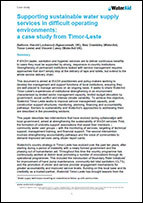Supporting sustainable water supply services in difficult operating environments: a case study from Timor-Leste
 If WASH (water, sanitation and hygiene) services are to deliver continuous benefits to users they must be supported by strong, responsive in-country institutions. Strengthening of permanent institutions tasked with service management requires approaches that don’t simply stop at the delivery of taps and toilets, but extend to the whole service delivery chain. This document is aimed at WASH practitioners and policy-makers working to develop the management and support functions of local institutions, ensuring they are well placed to manage services on an ongoing basis. It seeks to share WaterAid Timor-Leste’s experiences of institutional strengthening in an environment characterised by limited sector management capacity, limited budget allocation by government, social conflict and intense climate variability. To achieve this objective, WaterAid Timor-Leste works to improve service management capacity, post-construction support structures, monitoring, planning, financing and accountability pathways. Barriers to sustainability and WaterAid’s approaches to addressing them are described in the proceeding sections.
If WASH (water, sanitation and hygiene) services are to deliver continuous benefits to users they must be supported by strong, responsive in-country institutions. Strengthening of permanent institutions tasked with service management requires approaches that don’t simply stop at the delivery of taps and toilets, but extend to the whole service delivery chain. This document is aimed at WASH practitioners and policy-makers working to develop the management and support functions of local institutions, ensuring they are well placed to manage services on an ongoing basis. It seeks to share WaterAid Timor-Leste’s experiences of institutional strengthening in an environment characterised by limited sector management capacity, limited budget allocation by government, social conflict and intense climate variability. To achieve this objective, WaterAid Timor-Leste works to improve service management capacity, post-construction support structures, monitoring, planning, financing and accountability pathways. Barriers to sustainability and WaterAid’s approaches to addressing them are described in the proceeding sections.
